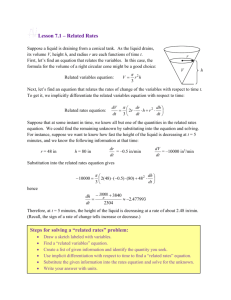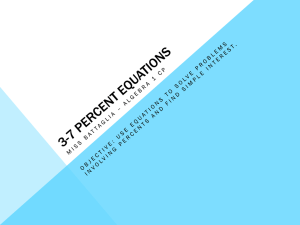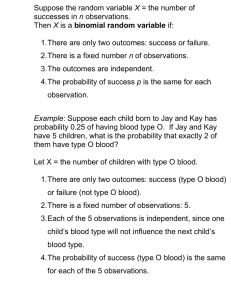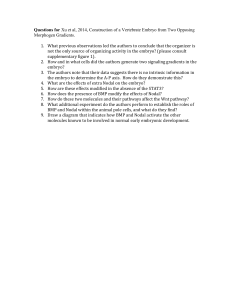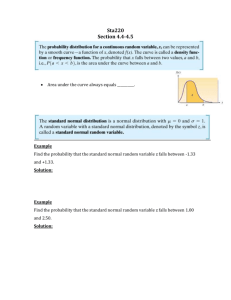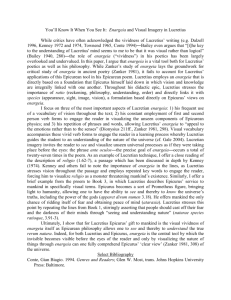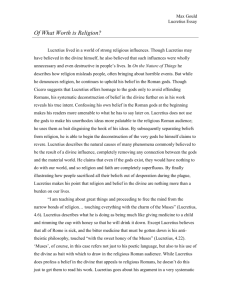Notes on the Lucretian argument
advertisement
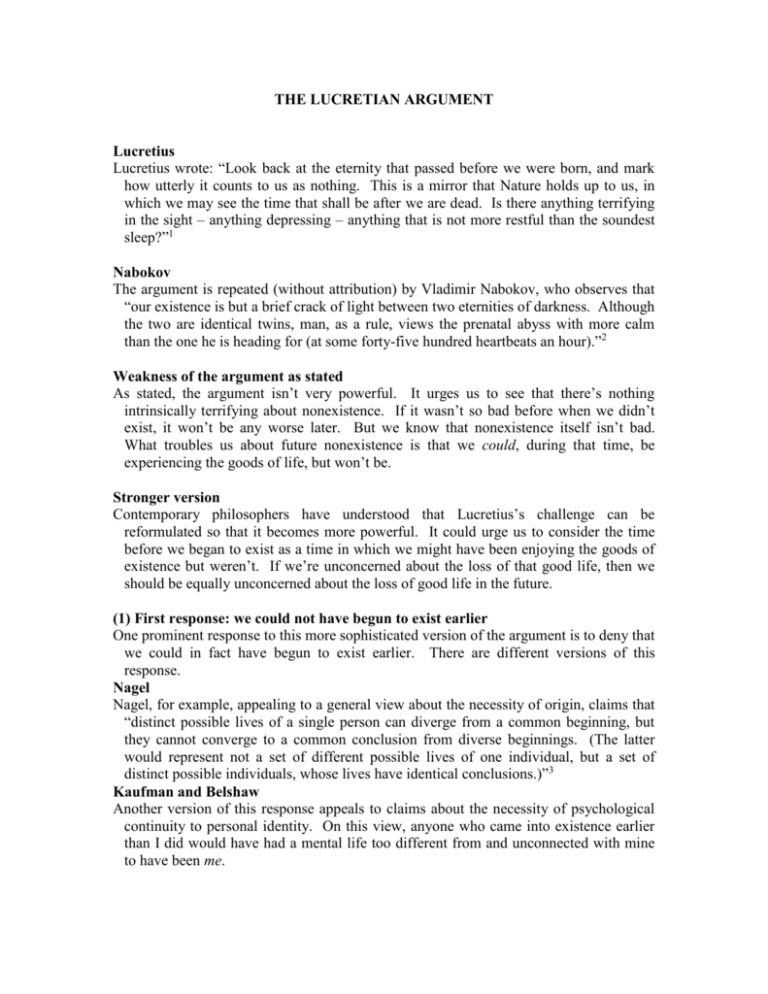
THE LUCRETIAN ARGUMENT Lucretius Lucretius wrote: “Look back at the eternity that passed before we were born, and mark how utterly it counts to us as nothing. This is a mirror that Nature holds up to us, in which we may see the time that shall be after we are dead. Is there anything terrifying in the sight – anything depressing – anything that is not more restful than the soundest sleep?”1 Nabokov The argument is repeated (without attribution) by Vladimir Nabokov, who observes that “our existence is but a brief crack of light between two eternities of darkness. Although the two are identical twins, man, as a rule, views the prenatal abyss with more calm than the one he is heading for (at some forty-five hundred heartbeats an hour).”2 Weakness of the argument as stated As stated, the argument isn’t very powerful. It urges us to see that there’s nothing intrinsically terrifying about nonexistence. If it wasn’t so bad before when we didn’t exist, it won’t be any worse later. But we know that nonexistence itself isn’t bad. What troubles us about future nonexistence is that we could, during that time, be experiencing the goods of life, but won’t be. Stronger version Contemporary philosophers have understood that Lucretius’s challenge can be reformulated so that it becomes more powerful. It could urge us to consider the time before we began to exist as a time in which we might have been enjoying the goods of existence but weren’t. If we’re unconcerned about the loss of that good life, then we should be equally unconcerned about the loss of good life in the future. (1) First response: we could not have begun to exist earlier One prominent response to this more sophisticated version of the argument is to deny that we could in fact have begun to exist earlier. There are different versions of this response. Nagel Nagel, for example, appealing to a general view about the necessity of origin, claims that “distinct possible lives of a single person can diverge from a common beginning, but they cannot converge to a common conclusion from diverse beginnings. (The latter would represent not a set of different possible lives of one individual, but a set of distinct possible individuals, whose lives have identical conclusions.)”3 Kaufman and Belshaw Another version of this response appeals to claims about the necessity of psychological continuity to personal identity. On this view, anyone who came into existence earlier than I did would have had a mental life too different from and unconnected with mine to have been me. 2 Rejection of the second variant This second idea reason for thinking we couldn’t have had an earlier origin rests, I believe, on a metaphysical error. I’m now identical with a late-term fetus that was in fact born in Georgia 50 years ago. I am, moreover, psychologically continuous with that fetus, albeit only weakly. But suppose that shortly before I was born my parents had converted to Islam and emigrated to Pakistan to live the lives of pious Muslims. If that had happened, there would now be a 50-year-old Caucasian Muslim living in Pakistan who would be identical with that same fetus and would, moreover, be psychologically continuous with it, albeit weakly. But that person’s mental life would have been utterly different from mine. Nevertheless, since I’m in fact identical with that fetus and that Muslim in Pakistan would have been identical with it, it follows, from the transitivity of identity, that that Muslim would have been identical to me – that is, would have been me. In other words, there are alternative histories of the world in which my mental life would have been very different. Even if the criterion of personal identity over time is psychological continuity, psychological continuity is not the criterion of identity across possible worlds. Rejection of the first variant I think Nagel’s view is mistaken as well. The necessity of origin Some version of Kripke’s notion of the necessity of origin is probably right. Let’s make that assumption. But to say that the individual gametes through whose fusion my organism was formed were essential to my existence is probably too strong. It seems to me that I could have existed if, for example, the same egg had been fertilized by a different sperm, but one with copies of the exact same chromosomes carried by the sperm that in fact fertilized the egg from which my organism developed. In other words, numerical identity of the gametes probably isn’t necessary, though near qualitative identity of the gametes, at least with respect to active genes, is. I suspect that the kind of worry Nagel was gesturing towards is that the exact gametes from which my organism was formed didn’t exist earlier and couldn’t have existed earlier; therefore I couldn’t have come into existence earlier than I did. Case of the frozen embryo But let’s forget about gametes for a moment. Suppose, for the sake of argument – what I believe to be true – that we’re not identical with our organisms and that we don’t begin to exist at conception but at some later point – for example, when the fetal organism develops the capacity for consciousness. On this view, we were never embryos. Next consider someone who’s the product of IVF. Her parents wanted a child but not until they were older. But they worried that conceiving a child when they were older would carry a higher risk that their child would have a congenital defect. So they had IVF and had the embryos frozen. They then waited 15 years before implanting the embryo that developed into this person. 3 I think this is a case in which, if the parents had implanted the embryo earlier, this same person would have had an earlier origin. (Remember: she was never the embryo; she began to exist only after the embryo was thawed, implanted, and developed a brain capable of consciousness.) Limited relevance? So there could be people who could have come into existence earlier than they did. But I didn’t develop from an embryo that was created via IVF and then frozen. Does this mean that, while some people might have had an earlier origin, I couldn’t have? If so, perhaps Nagel is right in most cases: most of us couldn’t have come into existence substantially earlier than we did. But I think this is wrong too. We just have to imagine my parents’ reproductive systems working a bit differently – for example, my mother’s ovaries could have released the egg from which my organism was formed earlier, and it could have been fertilized earlier by sperm that was nearly qualitatively identical to the one that actually fertilized it. Then, arguably, I would have begun to exist earlier. Conclusion: I could have had an earlier origin but the scenario is less realistic than one in which I have a later death The problem is that these stipulations are less realistic than those necessary for a scenario in which I would live longer than I in fact will. We think it would be easy for me not to step in front of the bus that’s in fact going to run me over one of these days. But it’s hard to see how the same genetic materials from which I developed could have been assembled earlier than they were. In short, a later death seems possible in a way that an earlier origin isn’t. A lot more would have had to be different for me to have had an earlier origin. (2) Second response: no reason to suppose earlier origin would have given me a longer or better life (Feldman) Feldman makes this point. But this misses the point of the argument. For an earlier origin to be relevantly symmetrical with a later death, we have to hold the death date constant. But this itself is problematic. It introduces more unrealistic assumptions. The relevance of such a comparison to the evaluation of our actual origin begins to fade if we have to imagine not only an earlier origin but, compatibly with that, roughly the same date of death. The claim that our actual origin is worse than an earlier one would have been is becoming more like the claim that death is bad because it deprives us of an immortal life. Certainly we can evaluate death by comparison with living forever, but that’s not the comparison we actually make when we want to know how bad a person’s death was. Case But cases of an earlier origin with the same death date are possible. Suppose that I developed from an IVF embryo that was frozen for 15 years before being implanted. Shortly after I was born my parents moved to an area where a natural eruption of toxic 4 gases caused all individuals under the age of 3 to have reduced longevity by an average of 15 years. I’m now 80 and am about to die. It’s reasonable to believe that if I hadn’t been exposed to the accident, I would have lived to be 95. If my parents had implanted the embryo that developed into me right after it was formed, I would have existed but wouldn’t have been exposed to the gases. Or even if I had, I would have been old enough to be immune to their effects. So it’s reasonable to believe that if my parents had implanted the embryo immediately, I would have begun to exist 15 years earlier than I did and would now be about to die at the age of 95. Therefore it’s coherent to suppose that a person could have had an earlier origin but roughly the same death date. (3) Third response: accept Lucretius’s argument (Feldman) Feldman claims that if we compare our actual life with an alternative life with an earlier origin but the same date of death, we should regret not having had the alternative life with the earlier origin. “There are … two ways in which we can rectify the apparently irrational emotional asymmetry. …We can follow Lucretius and cease viewing early death as a bad thing…. [Or] we can at least try to start viewing late birth as a bad thing. My suggestion is that … the latter course would be preferable. … Our emotional reactions toward pleasures lost by early death are quite different from our emotional reactions toward similar pleasures lost by late birth. If my proposal is right, this emotional asymmetry is irrational.”4 Criticism The proposal that Feldman refers to evaluates the effects of losses of life on the value of the life as a whole. If the effect on the value of a life as a whole of the life’s not starting earlier is the same as the effect of the life’s ending earlier, we should evaluate the two ways in which the value is reduced in the same way. But we don’t evaluate death in this way. If we did, we would have to regard the death of a fetus as the worse than the death of an older child or adult, because the reduction in the value of the life as a whole would be greater. [Adjust for desert? No: see The Ethics of Killing. Moreover, desert is forward-looking. This would negate the value of life added through an earlier origin. That is, if we imagine my life having begun earlier, it’s unclear why that would add to the value of my life as a whole given that I now can’t deserve to have more good in the past, before I deserved anything.] (4) Fourth response: the asymmetry in evaluation reflects an asymmetry of concern about the past and future (Parfit, Brueckner and Fischer) Brueckner and Fischer don’t dispute that we could have had an earlier origin and thus a longer life. But they claim that we don’t care about the loss of possible good in the past. They write: “If we have asymmetric attitudes toward past and future experienced goods, then death is a bad thing in a way in which prenatal nonexistence is not. … Death deprives us of something we care about, whereas prenatal nonexistence deprives us of something to which we are indifferent.”5 5 In short, we care about missing experiential goods in the future but not about having missed experiential goods in the past. B&F appeal to one of Parfit’s thought experiments in which I wake up with temporary amnesia. I’m told I’m patient who just had an extremely painful treatment or the patient who’s just about to undergo a less painful but still unpleasant treatment. Clearly I want to have had a greater pain in the past. But let’s imagine a more germane variant. I wake up from an operation with temporary amnesia and bandaged like a mummy. The nurse can’t see me and I can’t see myself. She knows that I’m one of two terminally ill patients, each of whom has about a month to live but one of whom is 40 while the other is 60. While the nurse goes off to check which of the patients I am, I muse about what she’ll discover. I don’t think I’d be indifferent. I’d rather have the earlier origin. I’d rather, other things being equal, have had the longer life. Of course, to learn that I’m the patient with the earlier origin would be to learn that I’m older now. And that may seem unappealing. But to test our intuitions about an earlier origin, we should equalize the amount of future good I could expect in either alternative. So if being older would be worse, there must by hypothesis be other compensating features that would make the future equally good. Once those are factored in, my preference for the earlier origin remains. It’s true that I may not care much about whether my past contained more pleasure. But a longer life makes more of other goods possible as well. For example, if I’ve had the longer life, it’s likely that I’ve accomplished more. And I want to have had a life of achievement, not, in this case, because that would make my future better, but because achievement contributes to the value of my life as a whole, and I care about that. Indeed, one of the main reasons people fear death is that it deprives them of further opportunities for achievement. Suppose I were to learn that while the 60-year-old patient has had a life of significantly greater achievement, the 40-year-old patient’s prognosis has been revised so that it now seems that he can live for 3 more months rather than just one. I may still prefer to learn that I’m the older patient, since that would mean that I had probably achieved more. There are, of course, limits to this – limits that are reached fairly quickly. If I learn, for example, that the 40-year-old patient actually has three years to live while the 60-yearold has only a month, I’ll want very badly to learn that I’m the 40-year-old, even if the 60-year-old’s life as a whole will have been not only much longer but far more distinguished in terms of achievement. It might be said that when, in the original example, I want to learn that I’m the older patient, my thought is really about death rather than about an earlier origin. For if I’m the younger patient, I’ll be dying prematurely, and no one wants that. But this is exactly the point. An earlier origin would prevent my death from being premature, just as a later death would. 6 At any rate, B&F, and Parfit, are of course right that there’s an asymmetry between our attitudes to past and future goods. It’s just not as strong as B&F suppose. Is it rational? Parfit doubts that it is; but I find it hard to share his skepticism. But I won’t pursue this here. (5) An earlier origin would have meant the absence from my life of what I now care about I think that B&F have got a large part of the explanation, but I don’t think the asymmetry in our attitudes to time is the only reason we regard the possibility of an earlier origin differently from the possibility of a later death. Let’s combine the elements of a couple of earlier cases. Suppose that I developed from an embryo that was frozen for 15 years and then implanted. And suppose that just after the embryo was created in vitro, my parents received an invitation to live and work in Pakistan – an invitation that, had they accepted it, would have made it easier for them to have a child. So if they had accepted, they would have implanted the embryo immediately. They didn’t do that, however, and I was exposed before the age of 3 to toxic gases.6 The alternative life that would have been mine had my parents implanted the embryo and emigrated would have been 15 years longer. That’s one reason for thinking it would have been better. And it might also have been better in other respects, relative to the values that would have informed it, than my actual life has been relative to my actual values. I might, for example, have been a famously pious and greatly revered imam. Being an imam would have been worse But that alternative life wouldn’t have contained the things that, in my actual life, I care about. I care about thinking clearly and carefully. I want, among other things, to achieve a proper understanding of the Lucretian argument. And I think it would be a waste of time to be an imam, and would make me a threat to the credulous. Of course, if I’m right about that, that may undermine my point. For the life I might have had as a devotee and exponent of false doctrines would, other things being equal, be an objectively worse life. Being a better philosopher – but absence of particulars So let’s change the example. Suppose that if my parents had moved to Pakistan, I would have grown up within a western enclave and been a vastly better philosopher than I am. In this and other respects, we may suppose, my life would have been better even by reference to the general values that inform my actual life. And it would have been 15 years longer. But it still wouldn’t have contained the particulars I care about. In that life, for example, my actual wife would have been too young for me to marry, and we would never have met in any case. So I would never have had my actual children. (This, I think, is similar to what Kaufman and Belshaw want to say, though they put it forward as a claim about identity. The original source of this idea is Robert Adams.) 7 Possibility of preserving even the particulars We should concede, however, that however unlikely it is that my life wouldn’t have contained what I most care about in my actual life, it’s not impossible that it could have. Suppose – counterfactually – that my actual life has been single-mindedly devoted to a certain goal: for example, writing philosophy. And suppose scientists tell me that I have the philosophy-writing gene and thus that any alternative life I might have had would have been one in which I would have written philosophy. If, therefore, I had been born 15 years earlier and, because I wouldn’t have been exposed to the gases, would probably have had a longer life, I probably would have been able to write more philosophy than I have. In that case I might regret not having come into existence earlier. Because of the asymmetry in my attitudes to the past and future, I won’t regret the loss of earlier possible life with the same intensity that I dread the loss of possible life in the future. If an earlier origin would have been better, that defeats the Lucretian argument But I can still acknowledge that I’ve suffered a significant loss. And that seems sufficient to undermine the Lucretian argument. For I can rationally acknowledge that both a later death and an earlier origin would make, or would have made, my life better. Hence on these assumptions there’s a symmetry, but it’s the one that Feldman defends, not the one that Lucretius defends. The fact that we’re not upset about not having had an earlier origin is irrelevant. What’s important is that we can rationally believe that our actual origin was bad in comparison with an earlier one. For what’s at issue about death is whether it’s rational to believe that it’s bad and not how we feel about it. There are, after all, some people who believe that death isn’t bad and don’t fear it. But that’s no challenge to the rest of us, for they may just be irrational. Why the original reply to Lucretius stands: merely possible alternatives that wouldn’t have occurred are irrelevant Even if it’s metaphysically possible that I could have had an earlier origin that would have given me a longer life that would have contained even more of the things that I actually care about, that’s in fact irrelevant to whether I can rationally regret not having had an earlier origin. Just as I evaluate death by comparison with what would actually happen if I weren’t to die when in fact I will, and not by comparison with some merely metaphysically possible future that wouldn’t have occurred, so I must evaluate the possibility of an earlier origin in terms of what my life would in fact have been like, insofar as that can be determined. And the truth is that none of the details and not even the broad outlines of that alternative life can be determined at all. Basically the only thing I can be confident about is that if I had had an earlier origin my life would have been radically different and wouldn’t have contained the attachments that I care about – for example to my wife, children, and friends. What’s more, there’s no reason to suppose that if I had had an earlier origin I would have had a longer life overall. 8 Therefore it’s rational for me not to regret that I didn’t have an earlier origin. Therefore there’s an asymmetry between an earlier origin and a later death. This is not an explanation of the common view This is an important result, though it doesn’t purport to explain why people don’t regret not having had an earlier origin. Nagel, if I recall correctly, observes in a footnote that the idea that it’s metaphysically impossible that one could have had an earlier origin is too sophisticated to explain the common lack of regret about an earlier origin. The same is true of the idea that if a person had had an earlier origin his life wouldn’t have contained the things that he actually cares about. But even if it doesn’t explain the common view, it supports it and shows how it can be rational. And that may be all that’s necessary to refute Lucretius. 1 Lucretius, On the Nature of the Universe, translated by R.E. Latham (Harmondsworth: Penguin, 1951), p. 125. 2 Vladimir Nabokov, Speak, Memory (New York: G.P. Putnam’s Sons, 1966), p. 19. Nabokov goes on, however, to note that he knows “of a young chronophobiac who experienced something like panic when looking for the first time at homemade movies that had been taken a few weeks before his birth. He saw a world that was practically unchanged – the same house, the same people – and then realized that he did not exist there at all and that nobody mourned his absence.” [Place this in the text?] 3 Thomas Nagel, “Death,” in John Martin Fischer, ed., The Metaphysics of Death (Stanford: Stanford University Press, 1993), p. 68. 4 Fred Feldman, “Some Puzzles About the Evil of Death,” in Fischer, p. 323. 5 Anthony L. Brueckner and John Martin Fischer, “Why Is Death Bad?,” in Fischer, p. 228. 6 [NB: Maybe in the frozen embryo case, the only difference is that in the actual world I would suffer a misfortune that I wouldn’t in the other.]

